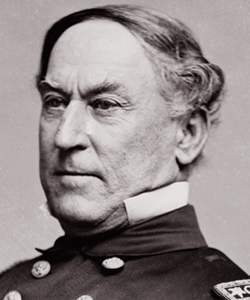David Glasgow Farragut, Fort Jackson & Fort St. Philip (American National Biography)
Scholarship
Farragut required two months to deploy his squadron on the lower reaches of the Mississippi River. Two forts, Jackson on the west bank and St. Philip slightly upstream on the east, a flotilla, and a boom across the river blocked Farragut's route. But Confederate armaments were inferior to those of the Union forces. After a six-day mortar bombardment failed to silence Fort Jackson, Farragut, against Secretary [of the Navy Gideon] Welles's orders and the counsel of his subordinates, decided to run the gauntlet without silencing the forts. He reasoned that more time would allow the Confederates to strengthen their defenses and to complete the ironclad Louisiana. Events justified his decision. More than any other high-ranking Union officer, Farragut would take inordinate risks to obtain monumental results. As with all Civil War commanders during the opening months of that conflict, Farragut initially lacked experience commanding a large force. Unlike others, Farragut overcame his inexperience by means of what Welles described as "innate fearless moral courage" and an ability to focus: "[Farragut] does but one thing at a time, but does that strong and well" (The Diary of Gideon Welles, vol. 1 [1911], p. 230). All except three of his seventeen vessels managed to pass the forts before daylight on 24 April [1862]. The ensuing riverine battle caused the loss of one Union and eleven Confederate vessels. Farragut then arrived at New Orleans the next day. The forts surrendered three days later making his victory complete. Farragut received the thanks of Congress and a commission as rear admiral ranking from 16 July 1862.
Lawrence L. Hewitt, "Farragut, David Glasgow," American National Biography Online, http://www.anb.org/articles/04/04-00361.html.
David Glasgow Farragut, Wartime Career (American National Biography)
Scholarship
Mobile Bay, coupled with his capture of New Orleans, elevated Farragut to well-deserved preeminence in the U.S. Navy. His willingness to lead where his subordinates feared to follow made these victories his alone. Neither a great strategist nor tactician, Farragut achieved his objectives by boldly relying on his intuition. Congress created the office of vice admiral, and signing the bill on 23 December 1864, President Abraham Lincoln promptly nominated Farragut. Later Congress created the grade of full admiral especially for Farragut, his appointment effective 26 July 1866.
Lawrence L. Hewitt, "Farragut, David Glasgow," American National Biography Online, http://www.anb.org/articles/04/04-00361.html.



